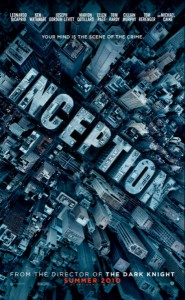 Christopher Nolan does it again: Inception is a wonderfully tricky mind-game disguised as a blockbuster movie. I enjoyed it immensely.
Christopher Nolan does it again: Inception is a wonderfully tricky mind-game disguised as a blockbuster movie. I enjoyed it immensely.
Out in the game design blogosector, Kirk Hamilton makes an interesting connection between Inception and in-game tutorials:
Inception’s Usability Problem
For me, Nolan’s dreamjacking caper was the film-going equivalent of sitting through a videogame that is all tutorial and no play.
For those of us in the gaming set, one of the coolest things about Inception is its narrative set-up. Here is a videogame movie that isn’t based on a game, it’s simply … a videogame movie. In other words, rather than adapting an existing game’s story a la Prince of Persia or Hitman, Inception presents an original story built on the fundamental tenets of videogames. It’s a tale of people transporting their consciousness into a construct where notions of life, death, time and identity become quite different than in the waking world. So I suppose it’s appropriate that the film’s biggest shortcoming feels so fundamentally game-y in nature.
I found Inception‘s script to be an overwhelming stream of unfettered information the likes of which would be inexcusable in a modern-day videogame. For the entire run of the film, characters do nothing but deliberately, forcefully explain and expound upon the ever-more-complex rules and systems that Nolan has designed, leaving the audience no room to actually internalize any of it.
— Kirk Hamilton @ Gamer Melodico
Charles Webb follows up on these ideas with some observations about how the Architect is what game designers would call a Level Designer:
The Film Inception: Architects Designing a Game
Watching the much-talked-about Inception, I couldn’t help thinking about the overlap between the movie and level design, the aspect of game development involving the creation of in-game environments. I was not the only one. Reading this very interesting take on Inception from game development blogger Kirk Hamilton’s site [see above], I was struck again by how the role of the architect (or would that be Architect?)
should have instead been that of a level designer. Hamilton’s piece looks at the movie in gaming parlance (and finds it lacking), it’s reliance on tutorial (the frequent explanation of the rules) putting him off from the narrative. What I found interesting, however, was how quickly one could jump from a discussion of this movie to one about games.
… In the modern parlance, shouldn’t Ariadne’s role [the Architect] more appropriately be given to a level designer? I wonder if this was something Nolan had in mind when writing the script for the movie –- he seems to be someone very cognizant of games, rules, and play, and must have some interest in those people who create the mechanics of each. My reading of Ariadne’s role in the film throws in language like “enemy encounters,” “spawn points,” and “critical path.” Indeed, as with a game, the characters are occupying goal-centered worlds with known sets of rules. If anything, a subtext of Inception, relevant to game and level designers, is how play can be impacted negatively when the rules are upset dramatically and frequently.
— Charles Webb @ Conducive Chronicle
Interesting points all round.
I’m a big fan of in-game tutorials. I got a lot of pleasure from Half-Life and Half-Life 2, in part because the tutorials were fun in their own right.